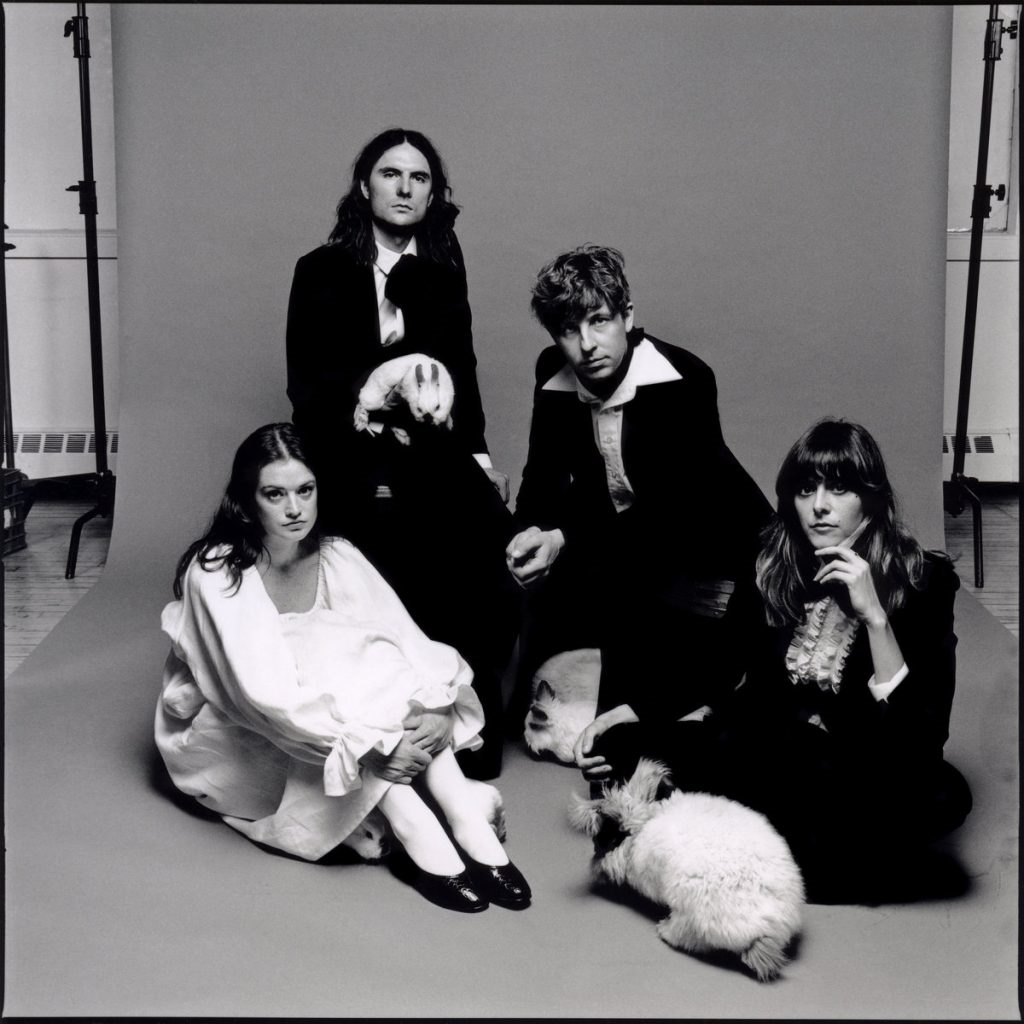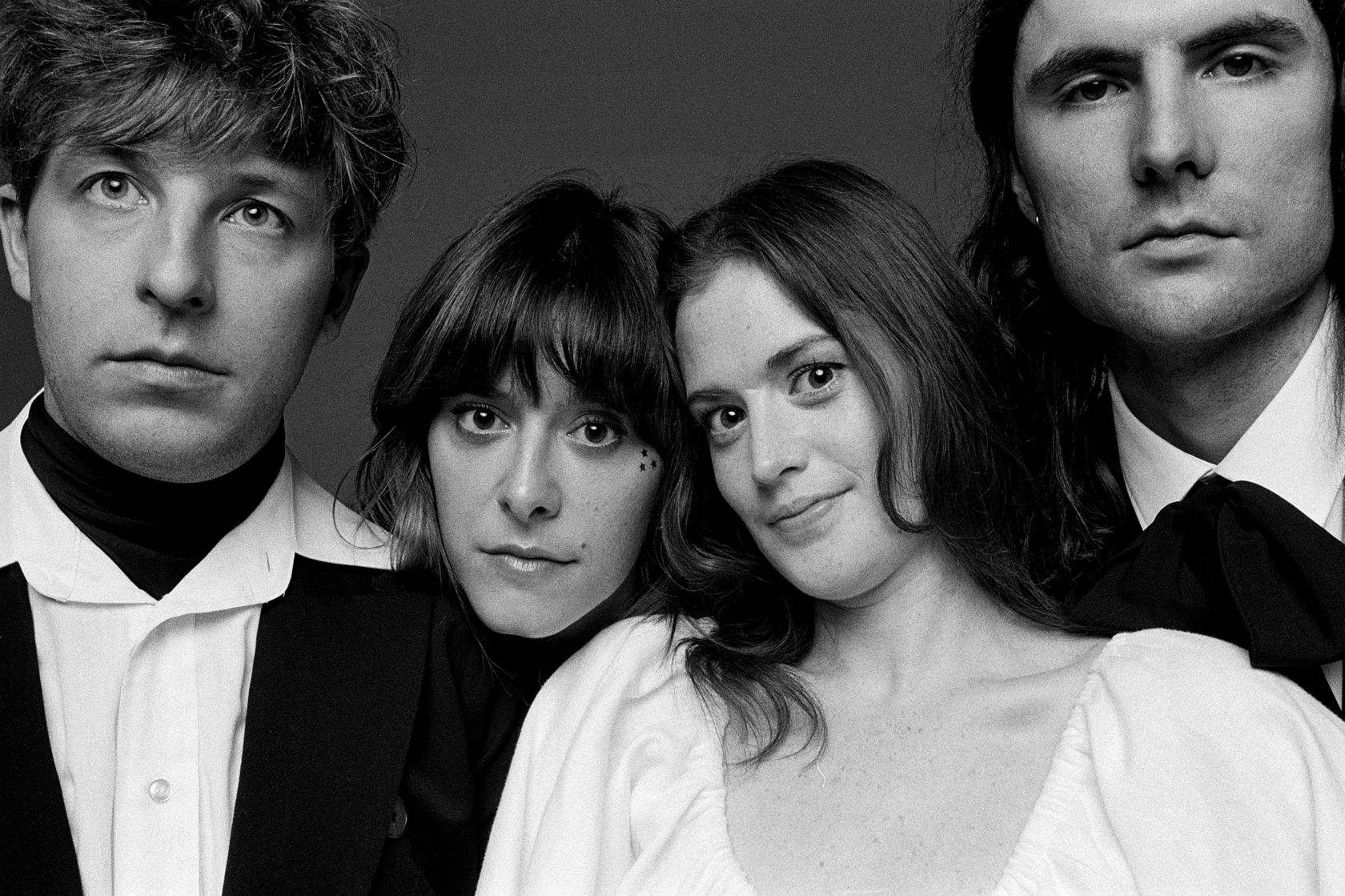TOPS: the context of time and DIY ethics
text
Roma Pavlov
То есть я могу попросить его показать?
Да.
15
19th November 2020


Jane Penny is a songwriter, producer, and lead singer of the band TOPS. This April, they released I Feel Alive ― their fourth album, — a record about love and the cycle of relationships. We spoke with Jane about moving from Montreal to Berlin, art in the context of time and DIY ethics, and the band's next album.
The album was released on your own label, Musique TOPS, can you tell us about it?
We made a label to release our own records, that’s why it’s called Musique TOPS! It was fun to make a logo and celebrate the foundation of the label, but it’s essentially just a way for us to release music directly to our audience, and it’s a better model financially for the band. We’ve found that if we want to make the music that we want to make, which doesn’t necessarily lend itself to being commercialized, then we have to make sure the business side of things is working for us.
I Feel Alive is quite different from your previous album, Sugar at the Gate. There are fewer synthesizers, your lyrics are now more personal. What helped you open up and start talking about your feelings?
It’s interesting that you find there to be less synthesizers, we definitely have synths on every song! But we did use different synths than before: there’s a lot of M1 and Poly 6. M1 is a digital synth which has a very different palette of sounds than the older analog synths we used in the past. I also didn’t play many of the synths on the record, so many of the keyboard parts are more traditional piano style parts. I was focused on arranging the songs and writing the lyrics and melodies instead, perhaps that’s also why the lyrics feel more personal. For our last record, there are some pretty abstract songs, I was more concerned with conjuring a state of being in the world, like what it feels like to drive around LA, or to be an adolescent, and this time around I wanted to make the songwriting as direct as possible. I was focused more on emotional honesty because I think that’s the most difficult thing to write about as a songwriter, the real challenge is to write a song that communicates a feeling without being cheesy and falling flat.
01
03
Given the subject matter of the album, it's hard to imagine that David wrote the lyrics, too. How did you manage to achieve this level of understanding?
David actually wrote many of the more emotional songs. «Ballads & Sad Movies» are basically written by him. What often happens is that one of us will either write a lot of the songs on our own, or we’ll have an idea of what we’re trying to say, and then we pick it apart, improving the word structure, or finish writing the verses or whatever. This process of scrutinizing the lyrics and melodies makes the songs a lot more powerful emotionally, and it’s fun to do with someone else. We’re able to do it without getting defensive, or being hurt, which is the key to our ability to do it together.
02
Will you sign other artists or is it exclusively for TOPS releases?
For now, it’s only for us. We all hate sending business emails too much to properly represent another artist. Maybe one day we’ll change!
04

That said, you still have connections with your previous label, Arbutus Records, how about them?
Sebastian, who founded Arbutus Record, still manages the band and is one of our closest friends. He’s been very involved in helping us establish our label and run the day to day operations. He’s one of those rare people who work to make artists' dreams come true even if it means putting their interests ahead of his own. So, as you can imagine, Arbutus Records is still like family for TOPS and vice versa.
05
You often talk about the DIY-approach, while also positioning yourself as a pop group. How do these two coexist in your image as a group?
Pop music is the kind of music we all love and (at least in our minds) make. We also happen to release our music on our own, without any help from big labels. It’s simple!
06
The fact that you direct and produce your music videos also fits your DIY approach. Is it difficult to participate in so many different processes?
It can be challenging, but it’s also really fun and inspiring. I’m much more comfortable directing and producing videos than I am starring in them, to be honest.
07
You have quite a large emphasis on the visual component. Is it possible for the four of you to decide on something like an album cover without conflicts?
The rest of the band gives me a lot of control over the process of designing our records. I work with the designer and then at certain points I bring options to the band and we’ll choose specific colors and things like that together. We’ve aimed to operate based on consensus since we started the band, so we’re used to handling these kinds of conversations.
08
You've been working closely with Hugo Bernier lately, would you call him a part of the TOPS team?
Yeah! He’s been really involved with our designs for a while now, he did everything for our newest record. It really helps to have one person that you can get designs from. Usually, we’ve worked with a specific designer for each album. I love the creativity that Hugo brings to his designs, he always surprises me in a good way.
09
You often say that the Montreal music scene is very small. Do you think you have outgrown it?
I’m sure that the Montreal scene has outgrown me too! It’s constantly turning over as new young people arrive, which is the beauty of it. There’s an ephemeral nature to the Montreal scene that allows it to evolve really rapidly, which is why I think it’s become a cultural center of sorts.
Now you’re in Montreal, but before the quarantine, you lived in Berlin. How did the city and its culture affect you? I recall that after living in Los Angeles, you had to reconsider your outlook on life.
I actually managed to go back to Berlin a couple months ago. Being here is very different than being in Montreal, though the cities do have a lot of similarities. Berlin is a much bigger city than Montreal, and I’m not established here in the same way, so there’s a sense that there are new experiences waiting for me here, something that I’m looking forward to when the coronavirus is under control. As someone who grew up in the middle of Canada, far from any of the major cities, being in Europe and having the ability to travel between many different countries is really exciting.
10
12
Right now, do you identify yourself as a member of the Montreal, or the Berlin scene?
Right now, I consider myself a free agent. I don’t really identify with any scene, but I’m definitely a product of Montreal. They both have multiple scenes and many friendly people. I’m just not that scene-oriented these days.
11
In the meantime, [your drummer] Riley lives in Los Angeles. Do you think your decentralization affects the sound?
We’ve been working on a new record the past few months where Riley has been recording drums without ever playing the songs with us, so it will be our most decentralized record yet! But, to be honest, it really doesn’t affect the sound at all.
13

Given the fact that tours have been canceled, is there any sense of incompleteness because the usual cycle of album-promo-tours has been violated?
When the lockdowns started I went through a period of mourning the future that I was planning on, and which I never had an opportunity to experience, like many people I’m sure. It was a real lesson for me, that you can plan for the future and imagine what will happen, but you really can’t control what happens.
14
As far as I know, you are not a fan of social media. Have you gotten used to it in the conditions where everything is now online?
I like social media, I just don’t want to live there all the time!
We’ve tried to make an effort to be available online, but we also realize that we can’t make up for the experience of having a real in-person show, and we aren’t trying to. The good thing is that we’ve been writing a lot of new music during the time that we would normally be on the road.
We’ve tried to make an effort to be available online, but we also realize that we can’t make up for the experience of having a real in-person show, and we aren’t trying to. The good thing is that we’ve been writing a lot of new music during the time that we would normally be on the road.
15
Is it difficult at all to think about creativity in a time like this?
I’ve had some extremely creative periods since the pandemic started, but I also just went almost 2 months without making any music at all, which is the longest break I’ve taken since I started. I think it’s a very difficult time to force creativity if it’s not in the air, and I doubt that pushing out something right now would result in great art. It’s been a great time to deconstruct my assumptions about being a musician, to take apart the way that I make songs. I think the work that comes out of this period will be some of my best work, but I don’t want to ruin this opportunity for a type of creative incubation to take place by rushing towards releasing something. Of course, financially this is a precarious time, but I’m trying to resist the urge to seek attention or validation just because I’m unsure about what the future will hold.
16
In a recent interview, you said you write a lot about what is happening now. Is it just a way to cope with stress, or a part of work on the new material?
This is kind of what I was just talking about. I went through a period where I was really inspired by the events happening around the world, but, as time went on, I realized how important it is to me for my music to thrive outside of the context of its historical moment. I still want to finish these songs, but they might take a very different shape by the time they come out. I’d rather make something that can hold onto its meaning for years and years than try to aim for the zeitgeist, it’s not my specialty.
17
By the way, is there a chance that you will do more electronic music? Recently, you released four remixes of «Colder & Closer», but you've never done any before.
We’ve never limited ourselves in terms of incorporating those elements, we usually have a couple songs on each record that stray away from the traditional band sound. And a lot of music that I make when I’m working alone is electronic. We decided to get remixes for the first time because «Colder & Closer» felt like it would lend itself really well to the format, and we had a lot of different musicians in mind to ask. I’m really happy with how they turned out.
18
What should we expect from the band in the near future?
We’re going to release new music as soon as we have a collection of songs finished, but our dream is to be able to tour the songs when we release them so we’ll have to see. In the meantime, David is releasing a solo EP as DVC Refreshments.
19
Do you feel alive right now?
Yes!
20









